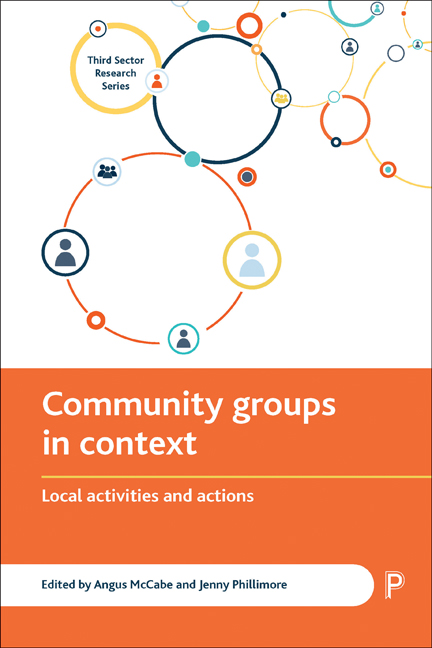Book contents
- Frontmatter
- Contents
- List of tables and figures
- Foreword
- Series editor’s foreword
- Acknowledgements
- Notes on contributors
- Introduction Why get below the radar? The importance of understanding community groups and activities
- Part One Scoping and mapping community actions and activities
- Part Two Community groups and activities in context
- Part Three Under-explored radars
- Part Four Thinking about voice, learning and emotion below the radar
- Index
ten - ‘More than a refugee community organisation’: a study of African migrant associations in Glasgow
Published online by Cambridge University Press: 05 April 2022
- Frontmatter
- Contents
- List of tables and figures
- Foreword
- Series editor’s foreword
- Acknowledgements
- Notes on contributors
- Introduction Why get below the radar? The importance of understanding community groups and activities
- Part One Scoping and mapping community actions and activities
- Part Two Community groups and activities in context
- Part Three Under-explored radars
- Part Four Thinking about voice, learning and emotion below the radar
- Index
Summary
Chapter aims
This chapter aims to:
• explore the contested nature of refugee community organisations;
• increase knowledge of the complex nature of migrant organising over time;
• focus on how migrant associations experience and respond to the challenges of immigration policies through identifying informal non-regulated activities;
• examine the effects of diversity within diversity and processes of change on migrant associations.
Introduction
Immigration to Scotland since the early 1990s has been characterised by the multiplicity of immigrants’ countries of origin. Most of these immigrants are new to Scotland, and come from countries with no specific historical or colonial links with Britain. Like a number of UK cities, Glasgow has experienced a dramatic increase in immigration particularly since the introduction of dispersal with the 1999 Immigration and Asylum Act. The city was, and remains, the largest dispersal site in the UK. Since the introduction of dispersal policy, although designed to disrupt social networks, considered by politicians to act as a ‘pull’ to further asylum migration, a number of informal and formal associations and networks have nonetheless emerged in dispersal areas across the UK. This chapter explores processes of change and development within African migrant, asylum-seeker and refugee-led associations in Glasgow from 2004 onwards, presenting new findings from the Scottish context.
Much research into associational practices among people claiming asylum, refugees and migrants generally draws on the concept of social capital (Putnam, 1995, 2002; Home Office 2004, 2009; Ager and Strang, 2008; Scottish Government, 2013). This concept is contested, not least for its lack of attention to power and conflict, its over-positive view of social networks and its conceptual fuzziness, which will be discussed in what follows (but see also Fine, 2002; Griffiths et al, 2005; Hynes and Sales, 2010). Nonetheless the idea of social capital has retained its popularity in policy debates, with varying degrees of rigorous evidence presented on the ways in which bonds, bridges and links enable service users to access a wide range of resources. Conversely, the widely cited literature on bridging and bonding social capital (Putnam, 2002; Cantle, 2004) argues that contact with predominantly co-ethnic, national or religious groups and non-contact with out-groups is harmful to integration, potentially leading to further social fragmentation (Putnam, 2002).
- Type
- Chapter
- Information
- Community Groups in ContextLocal Activities and Actions, pp. 199 - 218Publisher: Bristol University PressPrint publication year: 2017



